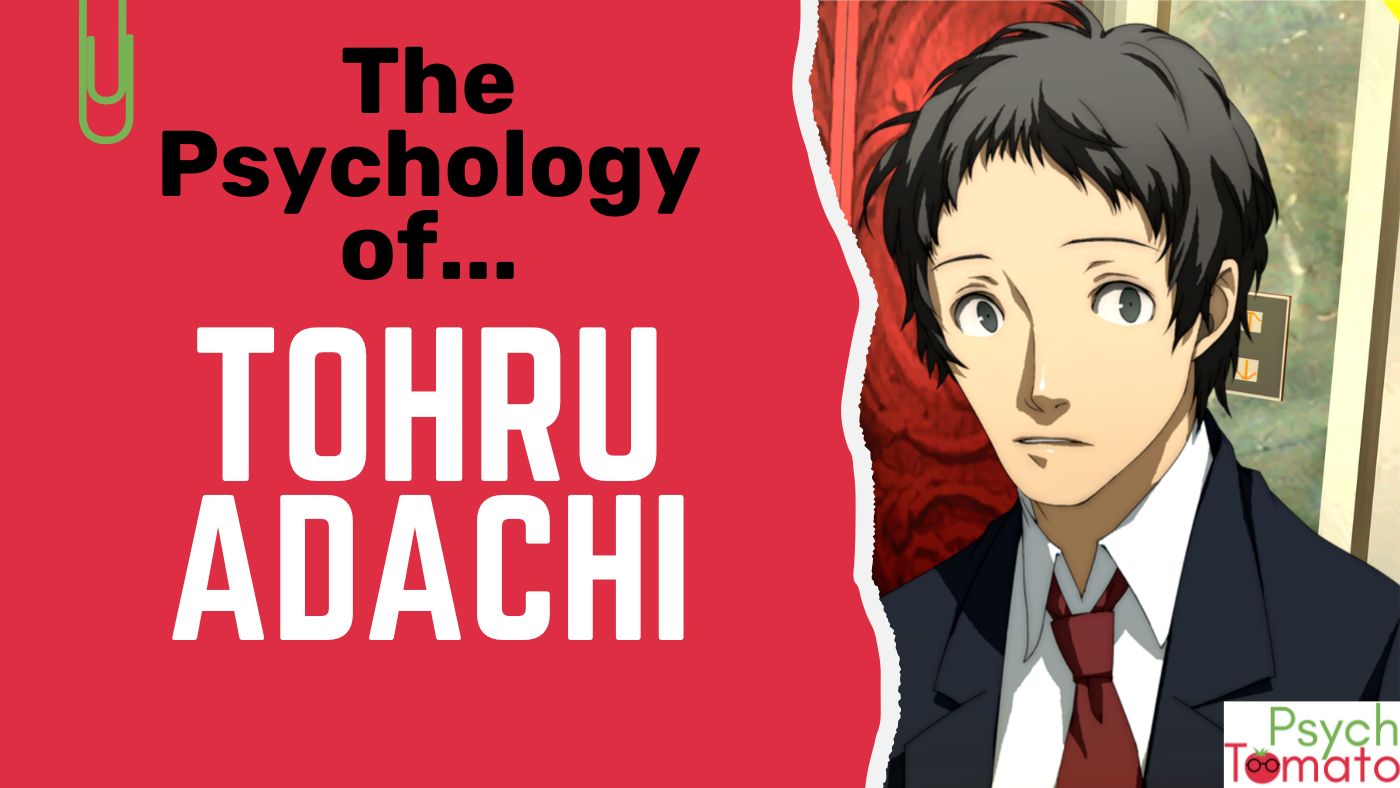At first impression, Tohru Adachi seems harmless. He’s clumsy, overeager, and often played for laughs as Detective Dojima’s bumbling partner.
But beneath those awkward smiles and nervous energy lies one of Persona’s darkest characters.
Adachi is not driven by revenge, ideology, or even desperation. His crimes are born from something quieter and far more unsettling: apathy, alienation, and the belief that nothing really matters.
Adachi’s story is a chilling reminder that evil doesn’t always come with fanfare.
Sometimes, it hides behind a smile.
Before We Begin: A Quick Note
Heads-up: this article contains spoilers for Persona 4 and Persona 4 Golden. If you haven’t finished the game and want to experience Adachi’s reveal firsthand, you might want to pause here and come back later.
Also, a reminder: this isn’t about diagnosing a fictional villain. Instead, we’re using Adachi’s arc as a lens to explore real psychological ideas like nihilism, antisocial traits, and moral disengagement, and how they can manifest in everyday life.
Meet the Character
Adachi enters the story as Ryotaro Dojima’s partner at the Inaba police department. He’s awkward, clumsy, and often the butt of jokes. All in all, he’s seemingly pretty ill-suited for detective work.
His goofy demeanor makes him easy to dismiss, which is exactly why his eventual reveal as the true antagonist is so incredibly shocking.
Beneath the mask of comic relief is a man who feels profoundly alienated.
Adachi views the world as meaningless and people as foolish actors in a pointless play. His crimes (i.e, pushing victims into the TV world and manipulating events from the shadows) are not motivated by ideology or necessity. They’re acts of boredom, a way to break the monotony of a life he sees as empty.
This is what makes Adachi so unsettling: he’s not a mastermind or a monster. He’s ordinary.
And that ordinariness is precisely the point.
Spotlight Scenes: Nihilism and the Banality of Evil
Adachi’s worldview comes into sharp focus during his confession. He mocks the Investigation Team’s search for truth and meaning, insisting that life is pointless and that people are “idiots” who are just going through the motions.
His murders, he claims, were “just for fun.”
This chilling detachment embodies what philosopher Hannah Arendt called the banality of evil. It’s the terrifying idea that horrific acts can emerge not from grand hatred or ideology, but from ordinary people disengaging from morality. Adachi rationalizes his actions, blaming society, circumstance, or sheer boredom, while showing little genuine remorse.
His Social Link in Persona 4 Golden (the Jester Arcana) deepens this picture.
As we progress through his Social Link, Adachi mocks our protagonist’s attempts to find meaning, insisting that everyone is just pretending.
Yet his cynicism is eventually revealed as a defense mechanism.
Beneath the sneers, Adachi is a man terrified of his own failure, alienation, and insignificance. His nihilism becomes both his prison and his excuse.
The Psychology Behind the Smile
Adachi is a case study in nihilism, the belief that life has no inherent meaning.
When paired with antisocial traits (lack of empathy, impulsivity, disregard for norms), nihilism can fuel destructive behavior. Psychologists note that individuals who feel powerless, alienated, or chronically bored may commit harmful acts as a way to assert control or feel alive.
His behavior also clearly illustrates moral disengagement, a concept developed by psychologist Albert Bandura.
Moral disengagement occurs when people justify harmful actions by minimizing consequences, blaming others, or dehumanizing victims. Adachi embodies this perfectly: he distances himself from his crimes, dismisses the harm he causes, and frames himself as a victim of circumstance.
Of course, what makes his case even more disturbing is his role as a police officer. His badge gives him both authority and cover, allowing him to exploit trust while hiding in plain sight. Even Ryotaro Dojima doesn’t suspect Adachi, even when the case starts hitting close to home.
Evil doesn’t always wear a mask. It can wear a uniform.
Beyond Inaba: Why It Matters
Adachi’s story is quite the plot twist, but looking beyond Inaba, we see that it’s also a warning.
He challenges the comforting idea that evil is always dramatic, monstrous, or easily recognizable. Instead, he shows how disengagement, apathy, and alienation can quietly corrode morality until almost anything becomes possible.
Honestly, that’s even more unnerving when you think about it, eh?
In that light, it’s very tempting to dismiss Adachi as “evil for evil’s sake,” but that oversimplifies him. His nihilism isn’t so much a cartoonish love of destruction as it is the hollow resignation of someone who refuses to engage with meaning or responsibility. His actions are a distorted attempt to feel something, anything, in a life he sees as empty.
Placed alongside other characters, Adachi becomes even more striking, and the message of his character becomes crystal clear.
Where we as the protagonist find meaning through connection, and Dojima shoulders responsibility despite hardship, Adachi rejects both.
His arc is the dark mirror of the Investigation Team’s journey: terrifying proof of what happens when alienation wins.
Tomato Takeaway
Tohru Adachi’s arc is a chilling meditation on how nihilism and antisocial traits can breed moral disengagement and how evil can thrive not in grand gestures, but in the quiet absence of meaning and accountability.
Now I’d love to hear from you.
Do you think Adachi is a true nihilist, or is his worldview more of a mask for his own failures?
Share your thoughts in the comments! I’d love to hear how you interpret his story!
Fueled by coffee and curiosity, Jeff is a veteran blogger with an MBA and a lifelong passion for psychology. Currently finishing an MS in Industrial-Organizational Psychology (and eyeing that PhD), he’s on a mission to make science-backed psychology fun, clear, and accessible for everyone. When he’s not busting myths or brewing up new articles, you’ll probably find him at the D&D table or hunting for his next great cup of coffee.


